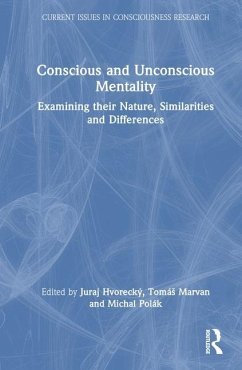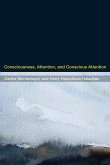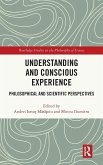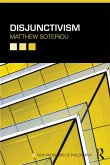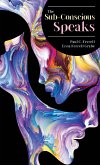Conscious and Unconscious Mentality
Examining their Nature, Similarities, and Differences
Herausgeber: Hvorecky, Juraj; Marvan, Tomas; Polak, Michal
Conscious and Unconscious Mentality
Examining their Nature, Similarities, and Differences
Herausgeber: Hvorecky, Juraj; Marvan, Tomas; Polak, Michal
- Gebundenes Buch
- Merkliste
- Auf die Merkliste
- Bewerten Bewerten
- Teilen
- Produkt teilen
- Produkterinnerung
- Produkterinnerung
In this collection of essays, experts in the field of consciousness research shed light on the intricate relationship between conscious and unconscious states of mind.
Andere Kunden interessierten sich auch für
![The Idea of Unity The Idea of Unity]() Edward MerkusThe Idea of Unity47,99 €
Edward MerkusThe Idea of Unity47,99 €![The Book of Wisdom ; With the Essay The Use of the Spiritual or Super-Conscious Mind By Henry Thomas Hamblin The Book of Wisdom ; With the Essay The Use of the Spiritual or Super-Conscious Mind By Henry Thomas Hamblin]() A. T. S. GoodrickThe Book of Wisdom ; With the Essay The Use of the Spiritual or Super-Conscious Mind By Henry Thomas Hamblin35,99 €
A. T. S. GoodrickThe Book of Wisdom ; With the Essay The Use of the Spiritual or Super-Conscious Mind By Henry Thomas Hamblin35,99 €![Consciousness, Attention, and Conscious Attention Consciousness, Attention, and Conscious Attention]() Harry Haroutioun HaladjianConsciousness, Attention, and Conscious Attention42,99 €
Harry Haroutioun HaladjianConsciousness, Attention, and Conscious Attention42,99 €![Understanding and Conscious Experience Understanding and Conscious Experience]() Understanding and Conscious Experience202,99 €
Understanding and Conscious Experience202,99 €![Disjunctivism Disjunctivism]() Matthew SoteriouDisjunctivism238,99 €
Matthew SoteriouDisjunctivism238,99 €![The Sub-Conscious Speaks The Sub-Conscious Speaks]() Erna Ferrell GrabeThe Sub-Conscious Speaks19,99 €
Erna Ferrell GrabeThe Sub-Conscious Speaks19,99 €![How Matter Becomes Conscious How Matter Becomes Conscious]() Jan FayeHow Matter Becomes Conscious66,99 €
Jan FayeHow Matter Becomes Conscious66,99 €-
-
-
In this collection of essays, experts in the field of consciousness research shed light on the intricate relationship between conscious and unconscious states of mind.
Hinweis: Dieser Artikel kann nur an eine deutsche Lieferadresse ausgeliefert werden.
Hinweis: Dieser Artikel kann nur an eine deutsche Lieferadresse ausgeliefert werden.
Produktdetails
- Produktdetails
- Verlag: Taylor & Francis Ltd
- Seitenzahl: 332
- Erscheinungstermin: 23. November 2023
- Englisch
- Abmessung: 234mm x 156mm
- Gewicht: 800g
- ISBN-13: 9781032529790
- ISBN-10: 1032529792
- Artikelnr.: 69030025
- Herstellerkennzeichnung
- Libri GmbH
- Europaallee 1
- 36244 Bad Hersfeld
- 06621 890
- Verlag: Taylor & Francis Ltd
- Seitenzahl: 332
- Erscheinungstermin: 23. November 2023
- Englisch
- Abmessung: 234mm x 156mm
- Gewicht: 800g
- ISBN-13: 9781032529790
- ISBN-10: 1032529792
- Artikelnr.: 69030025
- Herstellerkennzeichnung
- Libri GmbH
- Europaallee 1
- 36244 Bad Hersfeld
- 06621 890
Juraj Hvorecký is a researcher at the Department of Applied Philosophy and Ethics at the Institute of Philosophy of the Czech Academy of Sciences in Prague. He also teaches at the Undergraduate Program in Central European Studies (UPCES) in the Czech capital. He combines his interests in philosophy of mind with applied ethics, especially in the domain of disruptive technologies. Tomá Marvan is the head of the Department of Analytic Philosophy at the Institute of Philosophy of the Czech Academy of Sciences in Prague. Marvan is a philosopher of mind working at the intersection of philosophy, neuroscience, and psychology. He works on mental qualities, and on the differences between conscious and unconscious perceptual processing. Michal Polák is Professor of Philosophy at the University of West Bohemia, Pilsen, Czech Republic, where he is responsible for teaching and research in the field of philosophy of mind and cognitive sciences. He explores various aspects of phenomenal consciousness from a naturalistic perspective, the neural basis of consciousness, mind-brain identity, and selfhood.
Foreword 1. Introduction: Mapping the contrasts and parallels between
conscious and unconscious mind Part I. Conceptual issues 2. Conscious and
unconscious qualities: Conceptual relations between phenomenality,
what-it's-likeness, and consciousness 3. Blindsight is unconscious
perception 4. Against unconscious volition 5. On the alleged
misrepresentation problem. (Not a problem for HOT theories. Not a problem
for anyone, really.) Part II. Methodological issues 6. Methodological
considerations for the study of mental qualities 7. Can structuralist
theories be general theories of consciousness? 8. The old and new criterion
problems Part III. Unconscious qualities in perception and emotion 9. The
Brain-based argument for unconscious sensory qualities 10. Troubles with
the orthogonality thesis 11. Unconsciously smelling the self and others 12.
A feeling theory of unconscious emotions Part IV. Attention, degrees of
consciousness, and graduality 13. Degrees of attention and degrees of
consciousness 14. Template tuning and graded consciousness 15. Colour
bit-by-bit: The puzzle of colour development 16. (Un)conscious perspectival
shape and attention guidance in visual search: A reply to Morales, Bax, and
Firestone (2020)
conscious and unconscious mind Part I. Conceptual issues 2. Conscious and
unconscious qualities: Conceptual relations between phenomenality,
what-it's-likeness, and consciousness 3. Blindsight is unconscious
perception 4. Against unconscious volition 5. On the alleged
misrepresentation problem. (Not a problem for HOT theories. Not a problem
for anyone, really.) Part II. Methodological issues 6. Methodological
considerations for the study of mental qualities 7. Can structuralist
theories be general theories of consciousness? 8. The old and new criterion
problems Part III. Unconscious qualities in perception and emotion 9. The
Brain-based argument for unconscious sensory qualities 10. Troubles with
the orthogonality thesis 11. Unconsciously smelling the self and others 12.
A feeling theory of unconscious emotions Part IV. Attention, degrees of
consciousness, and graduality 13. Degrees of attention and degrees of
consciousness 14. Template tuning and graded consciousness 15. Colour
bit-by-bit: The puzzle of colour development 16. (Un)conscious perspectival
shape and attention guidance in visual search: A reply to Morales, Bax, and
Firestone (2020)
Foreword 1. Introduction: Mapping the contrasts and parallels between
conscious and unconscious mind Part I. Conceptual issues 2. Conscious and
unconscious qualities: Conceptual relations between phenomenality,
what-it's-likeness, and consciousness 3. Blindsight is unconscious
perception 4. Against unconscious volition 5. On the alleged
misrepresentation problem. (Not a problem for HOT theories. Not a problem
for anyone, really.) Part II. Methodological issues 6. Methodological
considerations for the study of mental qualities 7. Can structuralist
theories be general theories of consciousness? 8. The old and new criterion
problems Part III. Unconscious qualities in perception and emotion 9. The
Brain-based argument for unconscious sensory qualities 10. Troubles with
the orthogonality thesis 11. Unconsciously smelling the self and others 12.
A feeling theory of unconscious emotions Part IV. Attention, degrees of
consciousness, and graduality 13. Degrees of attention and degrees of
consciousness 14. Template tuning and graded consciousness 15. Colour
bit-by-bit: The puzzle of colour development 16. (Un)conscious perspectival
shape and attention guidance in visual search: A reply to Morales, Bax, and
Firestone (2020)
conscious and unconscious mind Part I. Conceptual issues 2. Conscious and
unconscious qualities: Conceptual relations between phenomenality,
what-it's-likeness, and consciousness 3. Blindsight is unconscious
perception 4. Against unconscious volition 5. On the alleged
misrepresentation problem. (Not a problem for HOT theories. Not a problem
for anyone, really.) Part II. Methodological issues 6. Methodological
considerations for the study of mental qualities 7. Can structuralist
theories be general theories of consciousness? 8. The old and new criterion
problems Part III. Unconscious qualities in perception and emotion 9. The
Brain-based argument for unconscious sensory qualities 10. Troubles with
the orthogonality thesis 11. Unconsciously smelling the self and others 12.
A feeling theory of unconscious emotions Part IV. Attention, degrees of
consciousness, and graduality 13. Degrees of attention and degrees of
consciousness 14. Template tuning and graded consciousness 15. Colour
bit-by-bit: The puzzle of colour development 16. (Un)conscious perspectival
shape and attention guidance in visual search: A reply to Morales, Bax, and
Firestone (2020)

